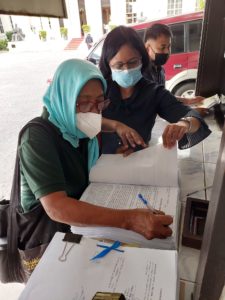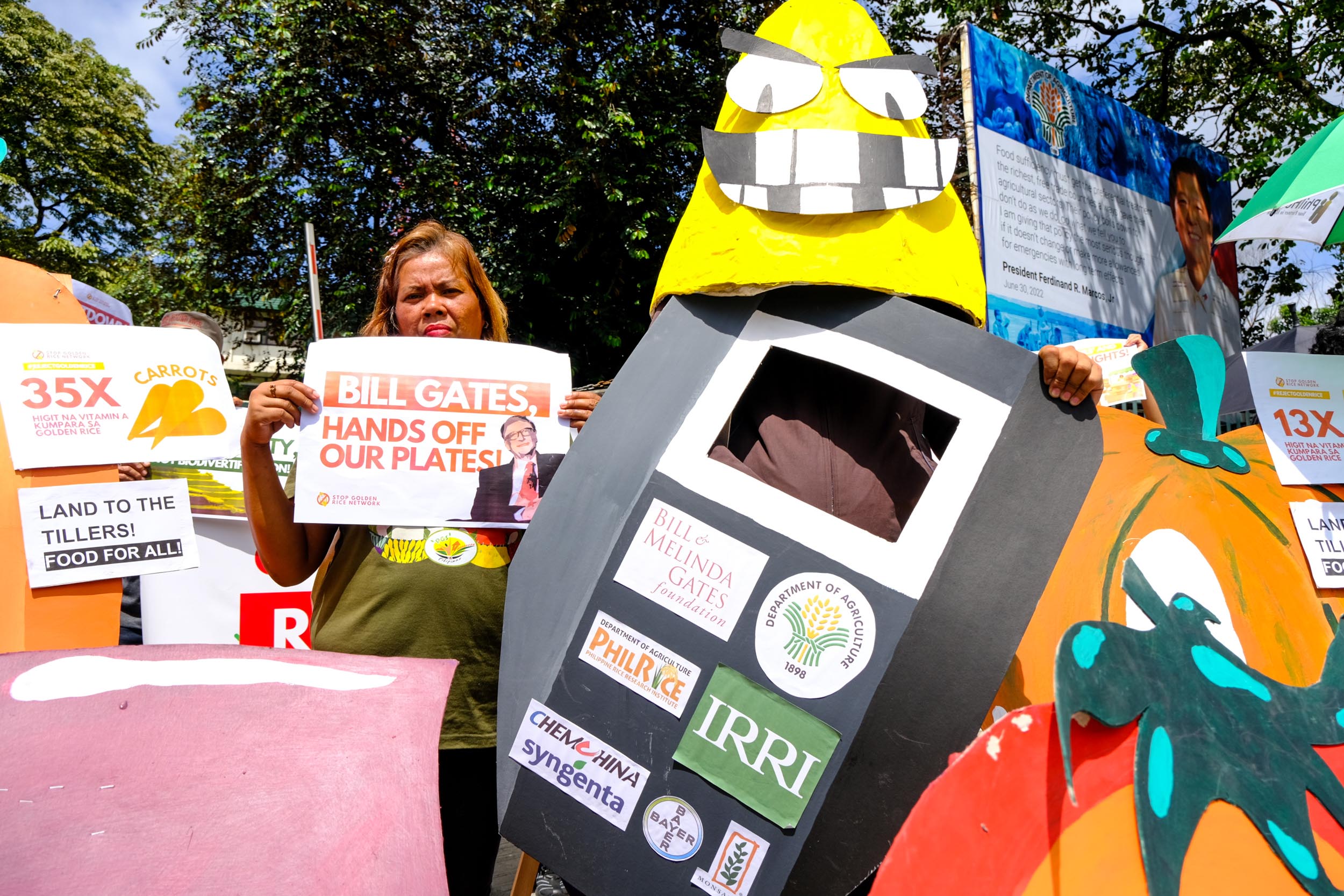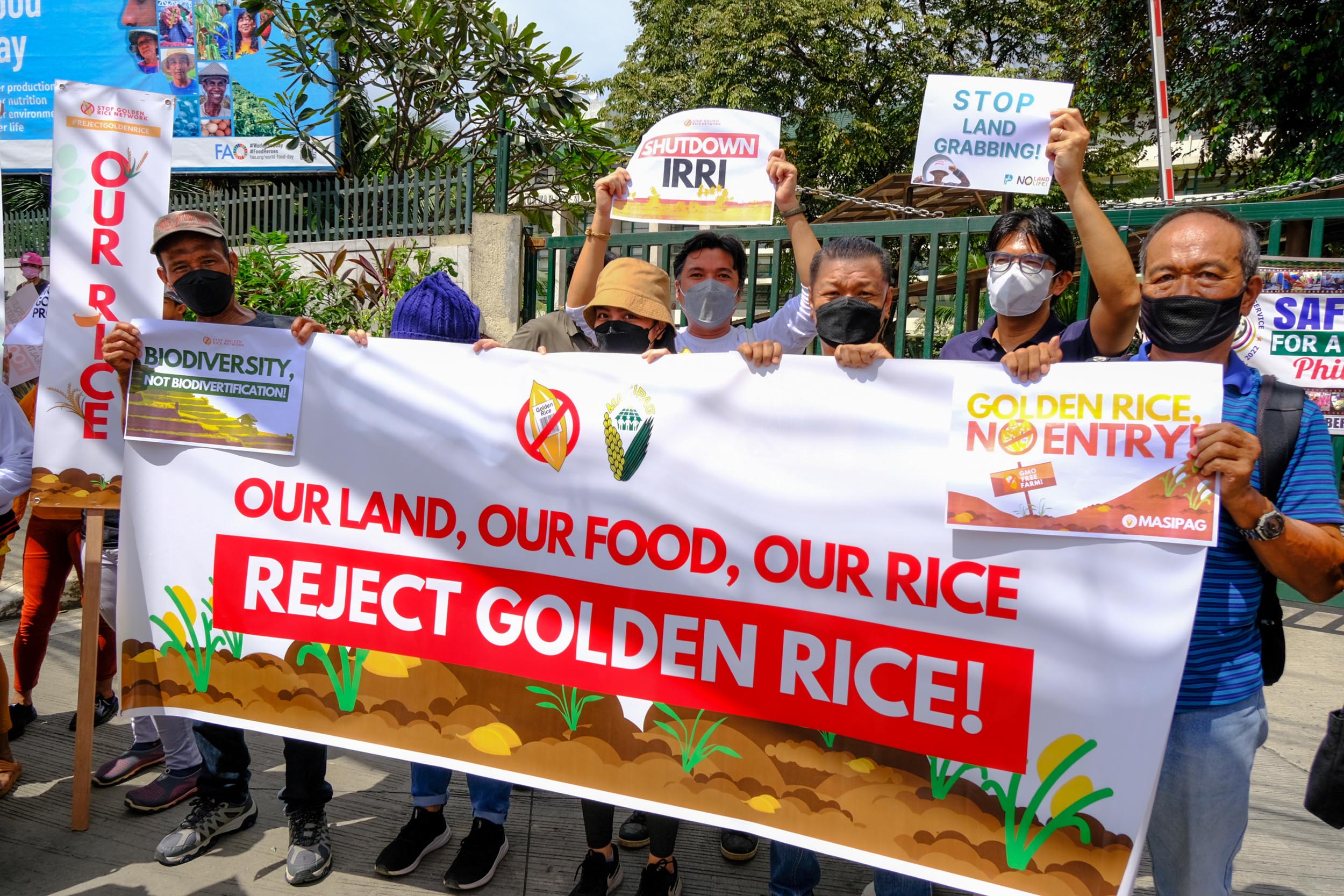Manila, Philippines—Lauro Diego takes special pride in his abilities to breed climate-resilient rice varieties. As one of the farmers of MASIPAG (Farmer-Scientist Partnership for Development), a network which conserves over 2,000 traditional and farmer-bred rice varieties, Diego dreads the day when Golden Rice seeds reach his town in Bataan, a province around 140 kilometers south of Manila.
In efforts led by the Department of Agriculture (DA), the genetically modified Vitamin A “enriched” rice is already being planted in 12 provinces across the country, with plans to expand to seven more provinces by the end of the year.
Citing risks of adverse and irreversible damage to the environment, rice biodiversity, and people’s health, as well as non-compliance with regulations governing biosafety permits, several farmers organisations, scientists, and civil society leaders filed a petition for a Writ of Kalikasan and Continuing Mandamus with the Supreme Court last October 17, aiming to stop Golden Rice commercialisation in its tracks.

Diego has a very simple reason why he refuses to plant Golden Rice. Not only does it threaten to wipe out rice varieties that had taken him years to breed, he also finds it absurd that he and his family should be forced to get their Vitamin A intake from lab-made rice, when natural sources of Vitamin A—such as malunggay (moringa), kalabasa (squash), and alugbati (upland spinach)—are cheap and abundant.
He also thinks that consuming staple food that is genetically-modified is fraught with unprecedented health risks for Filipinos. “Right now, we consume GMOs mostly through animals, which are fed with Bt corn. But with Golden Rice, we will be eating GMOs directly. Three times a day, seven days a week,” he said.
Golden Rice is the first GM staple food crop to be commercialised in Asia. Worldwide, GM crops are mostly used for animal feed and processed food, but not eaten as a staple crop, with the exception of GM white maize in South Africa.
Golden Rice was almost commercialised in the country almost a decade ago. But such plans were effectively halted by public opposition, culminating in the farmer-led uprooting of Golden Rice planted in the DA’s secret field trial in the province of Camarines Sur last 2013. However, a new application was submitted in 2017, which the DA approved in 2020. Advocates say that the government took advantage of pandemic-related restrictions to railroad its approval.
MASIPAG’s Dr. Chito Medina, an environmental scientist, said that no rigorous biosafety studies were conducted. “What they did was to simply analyze the chemical composition of Golden Rice, compared it with a list of allergens, and declared it safe based on that. This is a misrepresentation of science and wrong interpretation of the data. What they should have done is to feed it to animals and tested it for acute toxicity, chronic toxicity, and intergenerational toxicity,” he said in a press conference.
Meanwhile, petitioner Dr. Teodoro Mendoza, a crop scientist, raised concerns over the likelihood of cross-pollination between GM and non-GM crops. “Some parts of our country are very windy. Such natural characteristics of the Philippines increases the travel of pollens, which in turn increases the chance of Golden Rice reaching our remote farmers and rice terraces and outcrossing with our landraces and heirloom rice varieties. Seed mixing and other accidents may also lead to contamination. The effect of the outcrossing and/or contamination may be irreversible. Our landraces and heirloom varieties may be gone forever,” he warned.
Advocates further raised the lack of accountability in case of contamination of traditional rice varieties, which, they point out, have immeasurable historical, cultural and ecological value.
Petitioner and former anti-poverty commissioner Liza Maza meanwhile called Golden Rice a “hoax” by agrochemical transnational corporations (TNCs), a “false solution” which only aims to further tighten corporate control food systems—with their eyes on staple crops produced and consumed in the Global South. “Vitamin A Deficiency (VAD) in the Philippines is actually categorised as mild to moderate. But the VAD solution that they’re offering has serious effects on the environment and farmers’ livelihood,” Maza added.
The Bill and Melinda Gates Foundation’s latest five-year investment to promote Golden Rice in the Philippines and Bangladesh is worth USD 18 million. Millions of dollars have already been previously spent in Golden Rice research and development, with the latest variety still showing negligible amounts of beta-carotene, which has been shown to degrade further during storage.
Swiss agrochemical and seed giant Syngenta, acquired by China’s ChemChina and SinoChem, holds the patent to Golden Rice. The four biggest agrochemical companies, including Syngenta, control almost half of the global seed market.
Meanwhile, MASIPAG chair Virginia Nazareno, one of the farmer petitioners, pointed out that dependence on a few market-based GMO crops such as Golden Rice actually promotes poor diet with little nutritional diversity.

Petitioners cautioned the Philippine government against using Filipino women and children as “guinea pigs.” They also warned that Golden Rice will only increase farmers’ debts, as commercial seeds often come with expensive chemical inputs.
“Golden Rice will not solve the hunger faced by 48 million Filipinos, especially women. Poverty and malnutrition in rural communities is caused by lack of land, support services, post-harvest facilities, and policies that favor importation of agricultural goods,” said Cathy Estavillo of AMIHAN National Federation of Peasant Women.
Regardless of the outcome of the court petition, Diego urged his fellow farmers to not plant Golden Rice, and for consumers not to eat it for the sake of their health—“have pity on yourselves and on your families,” he said. Instead, he urged farmers to demand government support for local agroecological rice farming: “We must bring back life and sustenance to our lands, so that we can provide safe, affordable and enough food for all.”
Other petitioners against Golden Rice include Greenpeace Southeast Asia-Philippines, Southeast Asia Regional Initiatives for Community Empowerment (SEARICE), Kilusang Magbubukid ng Pilipinas (KMP), Climate Change Network for Community-Based Initiatives (CCNCI), Salinlahi Alliance for Children’s Concerns (SALINLAHI), and individuals including former defense secretary and senator Orlando Mercado, professor and consumer advocate Reggie Vallejos, and theater artist Mae Paner.
———————————————————————————————————
PAN Asia Pacific is a co-convenor of Stop Golden Rice Network.
Stop Golden Rice Network (SGRN) is a regional campaign network against the onslaught of corporate control in food and agriculture. It has more than 30 members from Bangladesh, India, Indonesia, Japan, Philippines, Sri Lanka, Thailand and Vietnam.
For more information please visit SGRN facebook page or message us at stopgrnetwork@gmail.com








Discussion about this post